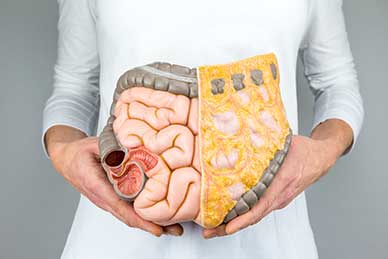Recent research on the gut-brain axis suggests that taking probiotics for anxiety and other mood concerns may be an effective choice.
Anxiety and stress are ubiquitous in the modern world. While many people rely on coping mechanisms that allow them to deal effectively with this stress, the core problem remains. Stress in daily life is so common and so severe in contemporary life that many people bow and even break under the strain. However, what if the modern diet is at least partly to blame for this increase in stress and the accompanying mood changes? New research on probiotics for anxiety suggests that your “gut instincts” may indeed be important: Many of our resources for handling stress may reside deep inside your gastrointestinal tract.
Your Gut-Brain Axis
 We may not think of our GI tracts and brains as being related, but research suggests that the connections are more common and deeper than we ever could have previously imagined. The bacteria in our guts help to metabolize not just precursors for important GI hormones, but the hormones themselves. In fact, there are more receptors for important neurohormones such as serotonin in our gut than anywhere else in the body.
We may not think of our GI tracts and brains as being related, but research suggests that the connections are more common and deeper than we ever could have previously imagined. The bacteria in our guts help to metabolize not just precursors for important GI hormones, but the hormones themselves. In fact, there are more receptors for important neurohormones such as serotonin in our gut than anywhere else in the body.
If you have noticed that your mood changes according to your diet, you are not alone. What you eat appears to have a huge effect on the microbiome in your intestines. Our diets can feed healthy bacteria and at the same time subdue bacteria that have more pathological effects. If we do not eat a diet rich in probiotics and the prebiotic foods that feed healthy GI flora, we may notice the effects on our mood far before we notice them in other areas.
The Healing Potential of Probiotics for Anxiety, Stress and More
With millions of Americans struggling with mental health disorders, new research on probiotics for anxiety and other mental health disorders can have far-reaching effects on public health. Recent findings suggest that the bacteria lactobacillus may be part of the key to managing many mental disorders. When people ingest probiotics, which are generally rich in lactobacillus and other beneficial bacterial species, they see a decrease in anxiety and their perception of stress.
This link between probiotics and anxiety relief is even stronger when the effects of prebiotics are taken into account. Prebiotics are special kinds of indigestible carbohydrates that are designed to support a healthy GI tract. While humans cannot digest and absorb these sugars, they serve as food for lactobacillus and other healthy GI fauna. Taking a prebiotic supplement can be effective in managing anxiety because it helps the healthy serotonin-producing bacterial populations to thrive.
More Bacteria, Less Stress
 Zebrafish are often used in studies regarding human health because they have similar hormones and exhibit similar behavior in response to these hormones. Recent research on these fish suggests that probiotics may be especially important for increasing positive hormones such as serotonin while reducing negative biochemicals that cause stress. In fact, zebrafish that were given probiotics in a recent study began to show not just a healthier hormonal balance, but less stress-related behaviors. Like humans, fish act differently, and in predictable ways, when they are under stress. Fish who are given supplements to encourage healthy gut fauna show fewer behaviors related to stress, suggesting that taking probiotics and prebiotics for anxiety and stress may indeed be effective for humans as well.
Zebrafish are often used in studies regarding human health because they have similar hormones and exhibit similar behavior in response to these hormones. Recent research on these fish suggests that probiotics may be especially important for increasing positive hormones such as serotonin while reducing negative biochemicals that cause stress. In fact, zebrafish that were given probiotics in a recent study began to show not just a healthier hormonal balance, but less stress-related behaviors. Like humans, fish act differently, and in predictable ways, when they are under stress. Fish who are given supplements to encourage healthy gut fauna show fewer behaviors related to stress, suggesting that taking probiotics and prebiotics for anxiety and stress may indeed be effective for humans as well.
How can gut bacteria affect both fish and humans so profoundly? Like humans, fish have many receptors for neurochemicals such as serotonin in their GI tract. Scientists are not sure why these receptors are more prominent in our intestines than in our brains, but the effect remains clear. People who have gut flora producing serotonin and its precursors are less likely to feel anxious or depressed. This is why taking probiotics for anxiety, stress and other mood disorders may have a meaningful impact.
The Links Between Gut and Brain
Have you ever felt nauseated or had a stomachache from stress? If so, you are not alone. Many people have intuitively noticed the link between their gut and their brain even before scientific research supported this connection. A healthy gut leads to less physical symptoms of stress and anxiety; a stomachache often is a symptom that something in our emotional lives has gone awry. If your stress often comes with a stomach ache or other GI symptoms, it may be time to try probiotics for anxiety. Our “gut instinct” that GI health affects the brain and mental health may be more accurate than we previously realized.
Mental health is not entirely in your head. According to research, it may be just as much in your stomach, small intestine and other components of your GI tract. Eating the right foods and taking measures to support healthy gastrointestinal flora may be the best thing you can do to support mental health. If you struggle with anxiety, it is not all in your head. Your gastrointestinal tract likely plays just as large of a role in how you are feeling on any given day. Consider taking a probiotic supplement to help soothe anxiety and help your brain to function at its very best.
 One of the most significant causes of death worldwide is acute respiratory illness. Even healthy people may fall critically ill from these infections, leaving them temporarily or permanently disabled and even threatening their lives. New research suggests that
One of the most significant causes of death worldwide is acute respiratory illness. Even healthy people may fall critically ill from these infections, leaving them temporarily or permanently disabled and even threatening their lives. New research suggests that  Probiotics are the friendly bacteria that colonize healthy digestive tracts and help our bowels work smoothly. However, these bacteria do not live independently in a “bubble.” Like all living creatures, they need food to live. This food is present in natural, more plant-based diets but may not be present in adequate quantities in the typical Western diet.
Probiotics are the friendly bacteria that colonize healthy digestive tracts and help our bowels work smoothly. However, these bacteria do not live independently in a “bubble.” Like all living creatures, they need food to live. This food is present in natural, more plant-based diets but may not be present in adequate quantities in the typical Western diet.
 You have probably heard the word “genome,” which refers to your DNA and the information contained within it. These genes are turned on and off according to our needs, producing the right proteins at the right time for survival by your epigenome. The epigenome is made up of millions of different kinds of molecules that govern gene expression. According to recent research, gut microbes impact us at this very fundamental level by
You have probably heard the word “genome,” which refers to your DNA and the information contained within it. These genes are turned on and off according to our needs, producing the right proteins at the right time for survival by your epigenome. The epigenome is made up of millions of different kinds of molecules that govern gene expression. According to recent research, gut microbes impact us at this very fundamental level by  Iron plays
Iron plays  If you believe that you are suffering from a deficiency of iron, there are several ways to quickly build up healthy levels of this vitamin. Many people simply add more iron-rich foods to their diets and take care to eat vegetarian sources of iron with an acidic food such as lemon. However, it can be difficult to get the iron that you need from diet alone, especially for women of reproductive age and young children who are growing quickly. For these people, taking an iron supplement or a
If you believe that you are suffering from a deficiency of iron, there are several ways to quickly build up healthy levels of this vitamin. Many people simply add more iron-rich foods to their diets and take care to eat vegetarian sources of iron with an acidic food such as lemon. However, it can be difficult to get the iron that you need from diet alone, especially for women of reproductive age and young children who are growing quickly. For these people, taking an iron supplement or a  The role of your gut flora in maintaining a healthy circadian rhythm and sleep is one of the most surprising connections to have sprung from modern chronobiology studies We already knew that these bacteria are important players in health, synthesizing nutrients and helping to break food particles in our diets. However, new research is finding that your mental health, autoimmune activity, and, yes, even sleep may depend in part on having a health gastrointestinal tract.
The role of your gut flora in maintaining a healthy circadian rhythm and sleep is one of the most surprising connections to have sprung from modern chronobiology studies We already knew that these bacteria are important players in health, synthesizing nutrients and helping to break food particles in our diets. However, new research is finding that your mental health, autoimmune activity, and, yes, even sleep may depend in part on having a health gastrointestinal tract.